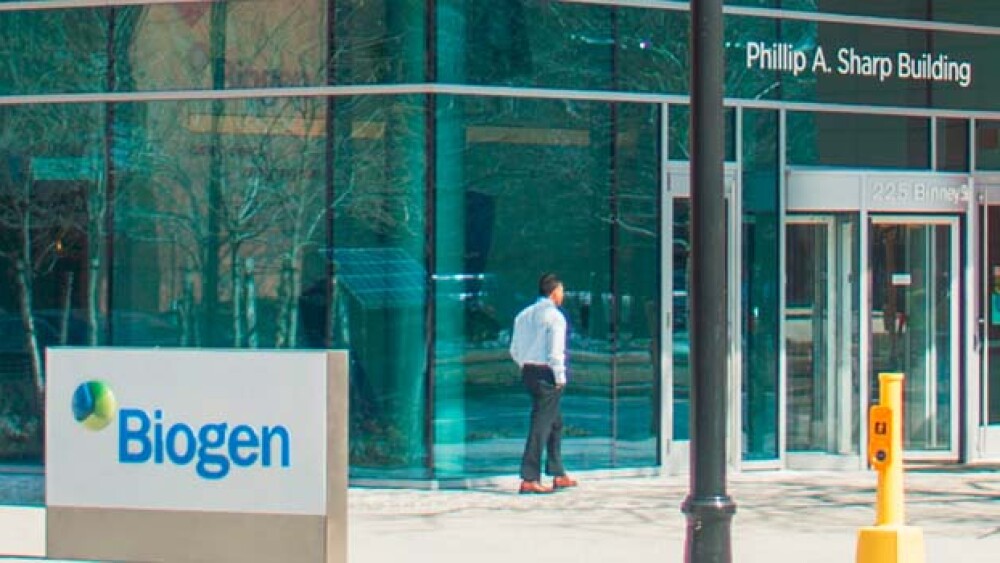Biogen saw a strong first quarter with 11 percent growth in revenues to $3.1 billion, which were spurred by gains in spinal muscular atrophy (SMA) treatment Spinraza and multiple sclerosis treatment Tecfidera.
Biogen saw a strong first quarter with 11 percent growth in revenues to $3.1 billion, which were spurred by gains in spinal muscular atrophy (SMA) treatment Spinraza and multiple sclerosis treatment Tecfidera.
Spinraza, which was the first regulatory approved treatment in the United States for SMA, generated $364 million in global revenues. Spinraza is an expensive treatment, particularly in the first year of therapy. For the six injections during the first year the cost of the treatment is about $750,000, or $125,000 per shot. After the first year, the price will drop to $375,000 per year. SMA patients will remain on the drug for the rest of their lives.
The company’s multiple sclerosis pipeline, which includes Tecfidera and royalties from Genentech’s Ocrevus, was the primary driver of Biogen’s first quarter. The pipeline brought in $2.1 billion, the company said. Tecfidera generated $987 million, which was ahead of the previous year’s first quarter. In 2017 Tecfidera generated $958 million. However, Tecfidera sales were down 8 percent when compared to the fourth quarter of 2017, when the drug pulled in 1.076 billion. Analysts had expected Tecfidera to at least match the most recent quarter.
If hemophilia revenues are not included in the company’s first quarter report, Biogen said its revenue growth was actually about 15 percent. Biogen spun off its hemophilia company Bioverativ last year.
During a conference call with investors and media Michel Vounatsos, Biogen’s chief executive officer, noted that the company’s core multiple sclerosis business remains resilient. That resilience remains despite the fact that Biogen’s MS revenues were negatively impacted during the quarter by approximately $180 million due to the difference between the channel inventory level changes for Tecfidera, Avonex and Plegridy.
Earlier this year the company did pull MS drug Zinbryta from the market, due to concerns over inflammatory encephalitis and meningoencephalitis. Zinbryta was approved in 2016 for the treatment of relapsing forms of multiple sclerosis. In the most recent full quarter Zinbryta was available it generated $12 million, according to Biogen’s first quarter data.
During the first quarter Biogen also saw opportunities for growth with two key deals. Most recently Biogen and Ionis Pharmaceuticals tied up a $1 billion 10-year developmental partnership to develop novel antisense drug candidates for a broad range of neurological diseases. The two companies are hoping to build on the success of their co-development of Spinraza. Biogen and Ionis have a goal of diving seven drug candidates into the clinic within the next two years.
Also during the first quarter Biogen acquired a Phase II-ready schizophrenia drug candidate from Pfizer. BIIB104, formerly dubbed PF-04958242, is an AMPA receptor potentiator. Biogen is on track to initiate the Phase IIb study in the second half of this year.
Over the next 12 months Biogen said it expects to see progress in its pipeline include expected milestones in multiple sclerosis and its Alzheimer’s disease programs. Biogen anticipates taking an asset it acquired from Alkermes plc last year and filing for approval with the FDA. Biogen anticipates head-to-head data from BIIB098 in comparison with its own Tecfidera. Before Biogen swooped in to buy the potential competition last year, Alkermes was looking at developing a treatment that had similar efficacy to Tecfidera but without some of the GI safety issues. During the conference call this morning Vounatsos said he believes the addition of the Alkermes drug is a benefit to Biogen’s pipeline.
Also, this year the company anticipates enrollment of a Phase III study for its most-watched drug candidate, aducanumab – a potential treatment for Alzheimer’s disease. This morning Biogen’s head of R&D Michael Ehlers said the company was well-aware of the risks in Alzheimer’s treatment, particularly the recent failure of Merck’s Phase III BACE inhibitor verubecestat. That trial was halted in February following an interim data analysis.





